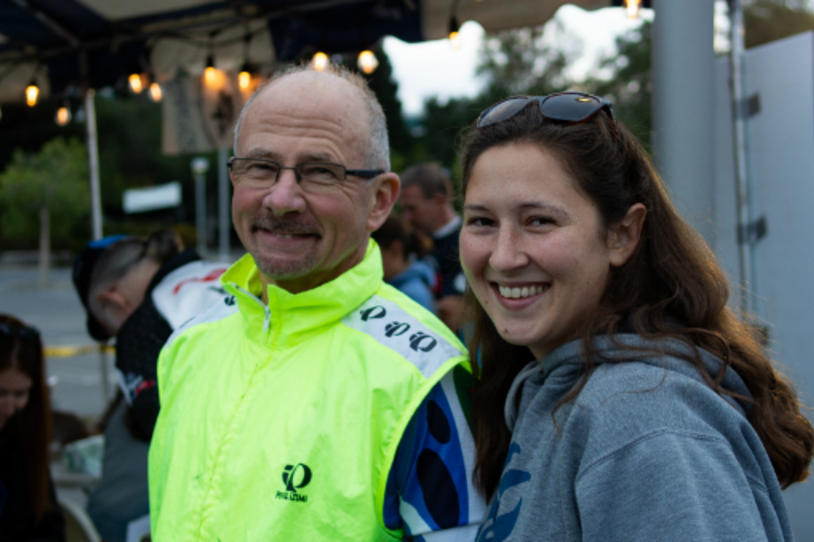
Charles Leblow with his daughter.
Charles Leblow, a 65-year-old resident of Clayton, California, doesn't do anything halfway. So in 2014, when the father of three and former manager for Peet's Coffee and Tea learned that he had Parkinson's disease, he got on his computer and started doing research. "One of the first websites I went to was Michael J. Fox (Foundation) -- it had the best information and I just delved into it. I wanted to learn everything." He explains, "Being on top of the research helps put my mind at ease."
One reason he was hungry for information: a hallmark of Parkinson's is that everyone's symptoms are different -- there are no cookie cutter cases, which can make diagnosis and treatment challenging. In Leblow's case, his first symptom, in February 2014, was a tremor in his pinkie, which he brushed off. But when he noticed that he was stumbling at work, and that his once razor-sharp memory was faltering, he decided to see a neurologist. "There was a lot of walking back and forth and other tests," he recalls. "The doctor also pointed out that I was dragging my left foot, and that my right arm had stopped swinging when I walked. I was just flabbergasted by the diagnosis."
Getting Active
As the news sank in, Leblow also began revamping his health and fitness routine. "My doctor was blunt -- she said the best thing I could do to slow the disease down was to do hard cardio exercise for a minimum of ten minutes a day, more if I felt like it." Once an avid cyclist and owner of a bike shop, Leblow pulled his old bike down from the rafters and pedaled for 15 minutes. "I was dog tired, but I started doing it every single day, and now I take spin classes for an hour, which gets me to my max heart rate." Leblow also began hiking, first on Mt. Diablo near his home, then with a goal in mind -- to hike Mt. Whitney, the tallest peak in the state. "I went with my family on a road trip, and I fell in love with the place -- there were young people, old people, all doing the round trip to the summit, which is about 24 miles. After my diagnosis, I said to my family, 'I'm going to climb Mt. Whitney in the next year, come hell or high water.' That was part of my plan to slow down the PD." He successfully completed the hike nearly a year to the day after his diagnosis.
Making a Difference Through Research
Leblow signed up to be part of The Michael J. Fox Foundation's (MJFF) online Fox Insight study, that gathers information from people with Parkinson's and their loved ones, including current symptoms, activities, even genetic information from 23andMe. The consumer genetics testing company has partnered with MJFF with the goal of helping researchers learn more about Parkinson's disease. Leblow also signed up for the 23andMe component of the Fox Insight study, contributing his genetic information and answering questionnaires from that site as well. The kind of data that Leblow and other patients contribute can shape the future of Parkinson's research. Combining genetic data with experiences reported directly by patients gives researchers a more holistic picture of the disease.
Leblow says the surveys on Fox Insight and 23andMe are having an impact for him personally. Answering questions about his symptoms and health helps him keep better track of how he is doing. "When the reminders come up on my computer, I don't dawdle -- I do them gladly." He notes that they "have led me to ask questions about the disease and my symptoms... and understand why something is happening to me and not just passing it off as old age aches and pains." Though he signed up for genetic testing to help research, he also learned new things about his heritage. His report showed he had unknown French ancestry. "Italian, German and Irish were mentioned by my family, but never French!"
Nearly five years after his diagnosis, Leblow is optimistic. "When you have an illness like Parkinson's disease, you can fall into feeling sorry for yourself. So many people I talk to -- they don't want to know the research, or to talk about the disease. I'm just the opposite. I've got an illness, and I'm not embarrassed about it. I learn and share with people every chance I get." He says joining Fox Insight and participating in research has a larger purpose, to help the scientific advancement of research on Parkinson's disease.
To learn more or sign up for the study, visit Fox Insight.